10 Companies with Data Strategies Driving Market Success

10 Companies with Data Strategies Driving Market Success
Overview
The article highlights how various companies leverage data strategies to drive market success. Notably, businesses such as Netflix, Amazon, and Salesforce utilize advanced data analytics and personalized approaches. These strategies enhance customer engagement, optimize operations, and improve decision-making.
What features do these data strategies possess? The advantage lies in their ability to provide tailored experiences for customers, ultimately leading to increased satisfaction and loyalty. The benefits are clear: companies that effectively harness data can achieve a significant competitive advantage in today’s market landscape.
As we delve deeper, it becomes evident that data plays a critical role in shaping business strategies. By illustrating these examples, the article encourages readers to consider how they can apply similar data-driven approaches within their own organizations.
In conclusion, the effective use of data not only drives operational efficiency but also fosters a deeper connection with customers, paving the way for sustained market success.
Introduction
In an era where data reigns supreme, the strategies employed by leading companies can often spell the difference between market dominance and obscurity. This article delves into ten innovative organizations that have harnessed the power of data to propel their success. Their unique approaches not only enhance operational efficiency but also redefine customer engagement. As these companies leverage data to gain a competitive edge, a pressing question arises: how can other businesses replicate their success in a landscape where data-driven decision-making is becoming increasingly vital?
Initial Data Offering: A Marketplace for Unique Datasets
The Initial Data Offering (IDO) is a dynamic platform designed to simplify the process of launching and discovering new datasets.
- Feature: By curating high-quality and unique datasets, IDO serves businesses, researchers, and organizations across the globe.
- Advantage: This approach addresses the disjointed nature of the information marketplace, ensuring that valuable datasets are easily accessible.
- Benefit: With a strong emphasis on community involvement and quality, IDO empowers individuals to leverage information for informed decision-making, positioning itself as an essential resource in today’s information-driven environment.
How can the availability of curated datasets transform your decision-making processes? By providing a centralized platform, IDO not only enhances accessibility but also encourages the utilization of data in innovative ways. As companies with data increasingly rely on it to drive their strategies, IDO’s role becomes crucial in facilitating informed choices.
In conclusion, the Initial Data Offering stands out as a vital tool for navigating the complexities of the information landscape. Its commitment to quality and community engagement ensures that users can harness the power of data effectively.
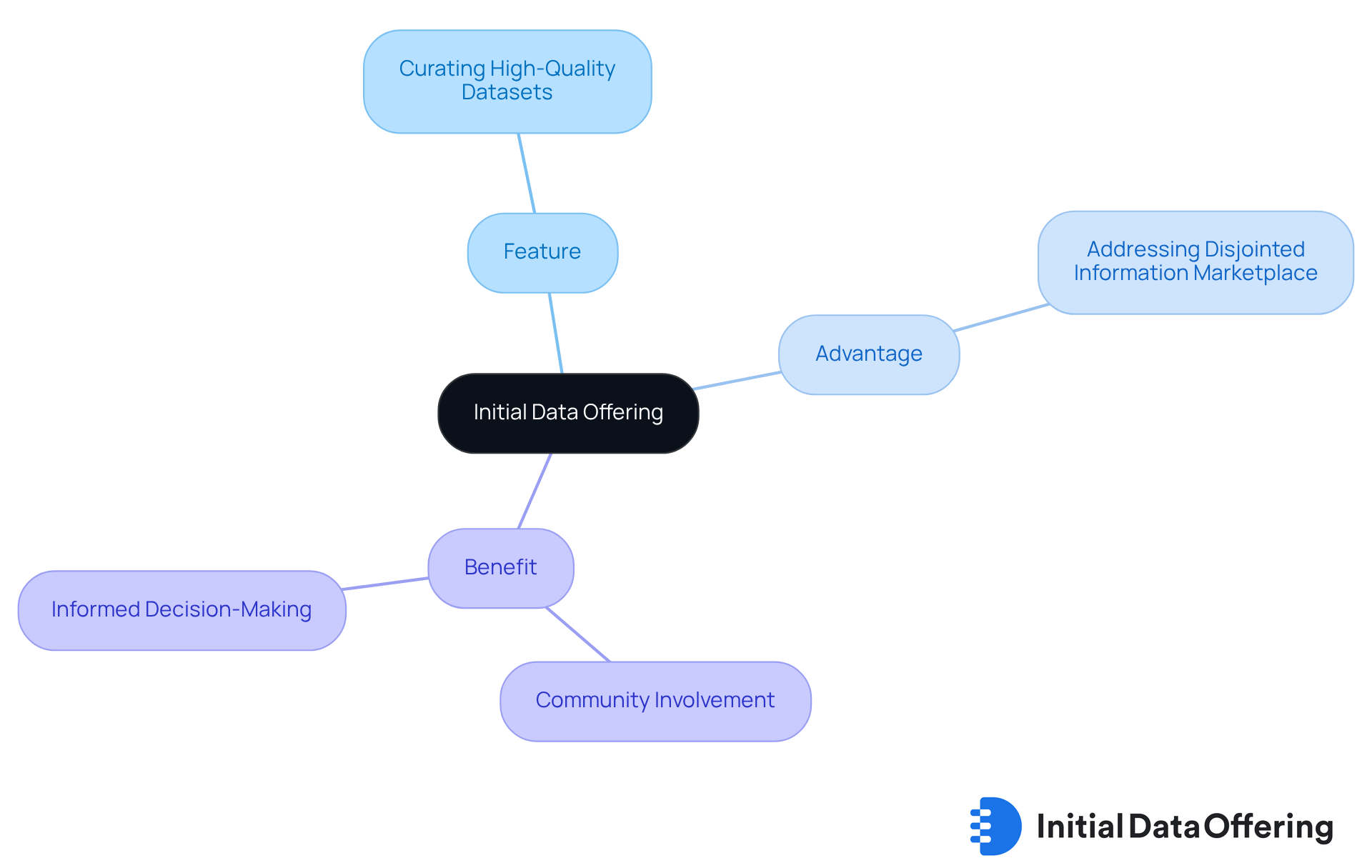
DCSC.ai: AI-Driven Economic Classification for Investment Insights
DCSC.ai leverages the power of artificial intelligence to revolutionize the categorization of economic information, offering actionable insights for investors. This innovative platform automates the classification process, enabling users to swiftly identify investment opportunities through real-time information analysis. The advantages of this methodology are clear: it not only enhances decision-making efficiency but also streamlines the overall investment process.
Consider the impact of AI-driven insights on portfolio performance and risk management. Case studies illustrate how DCSC.ai's approach has led to improved outcomes for investors. As the investment landscape evolves, companies with data are finding that the integration of AI into their strategies is becoming increasingly essential for adapting to market dynamics and achieving superior results.
Looking ahead, recent statistics indicate that the influence of AI on investment strategies is expected to rise significantly by 2025. Analysts stress the importance of AI tools in navigating complex market conditions. Financial analysts highlight that companies with data, including platforms like DCSC.ai, are vital for investors aiming to leverage data-driven insights for informed decision-making.
How can you utilize DCSC.ai to enhance your investment strategies? By embracing this technology, you position yourself to make more informed decisions in a rapidly changing market.
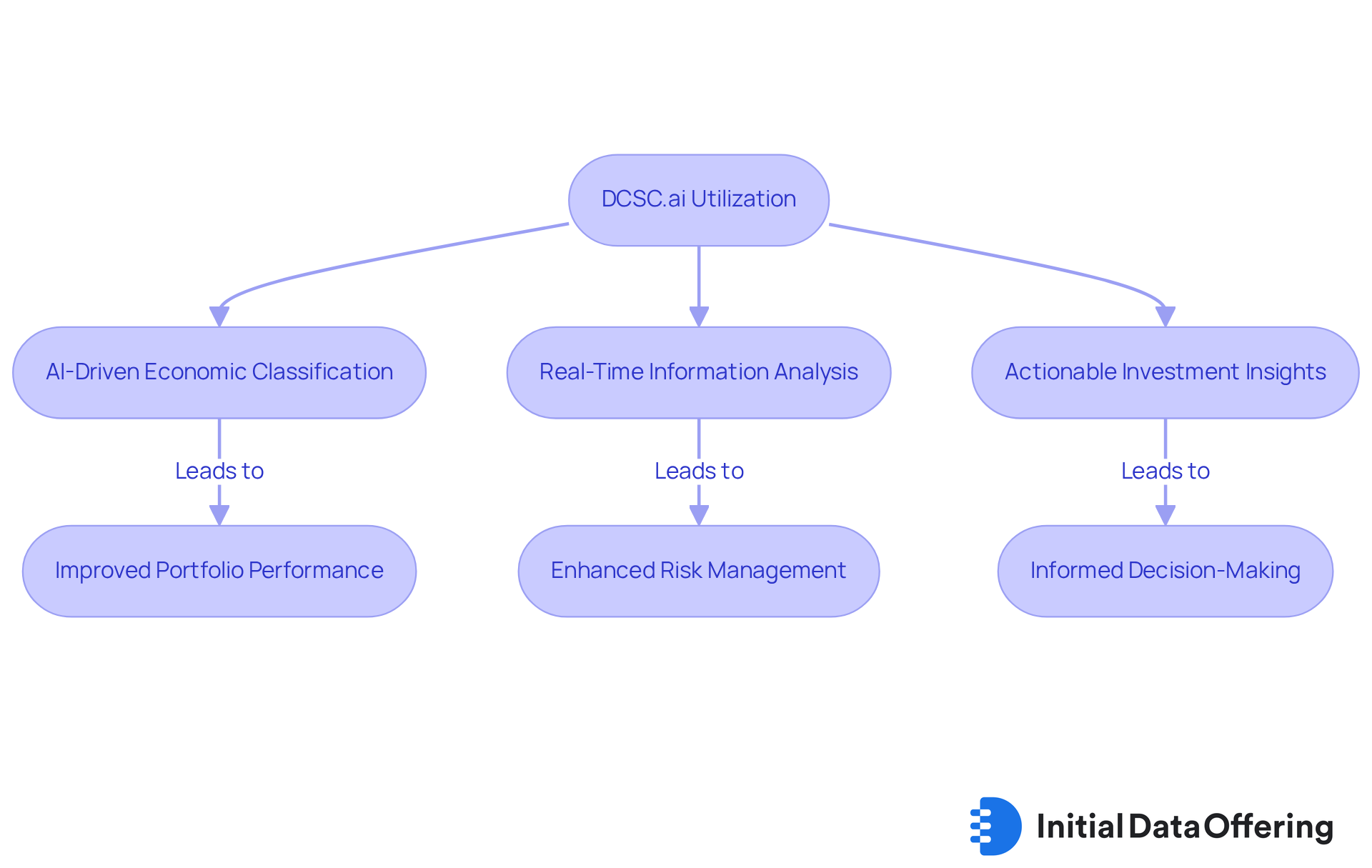
Salesforce: Enhancing Customer Engagement Through Data Analytics
Salesforce harnesses the power of data analytics to elevate customer engagement through personalized experiences. This platform features a robust examination of customer interactions and preferences, enabling businesses to create customized marketing approaches that resonate with their audience. The advantage of this data-driven methodology is twofold: it enhances customer satisfaction and significantly boosts sales growth. Research indicates that personalized marketing leads to increased consumer spending, particularly among younger generations.
As companies with data increasingly emphasize personalization—40% of marketers in Europe and the U.S. recognized it as a crucial approach in 2024—Salesforce distinguishes itself by offering powerful tools that facilitate this transformation. However, marketers face challenges in implementing personalization strategies, including insufficient technology, tools, and actionable data. Case studies illustrate that organizations utilizing Salesforce's features have effectively improved their marketing outcomes, underscoring the tangible benefits of integrating personalized approaches into their operations.
Ultimately, Salesforce exemplifies how effective information strategies can drive market success and foster enduring customer relationships. How might your organization leverage these insights to enhance its marketing efforts? By considering the implications of personalized marketing, businesses can better connect with their customers and achieve sustainable growth.
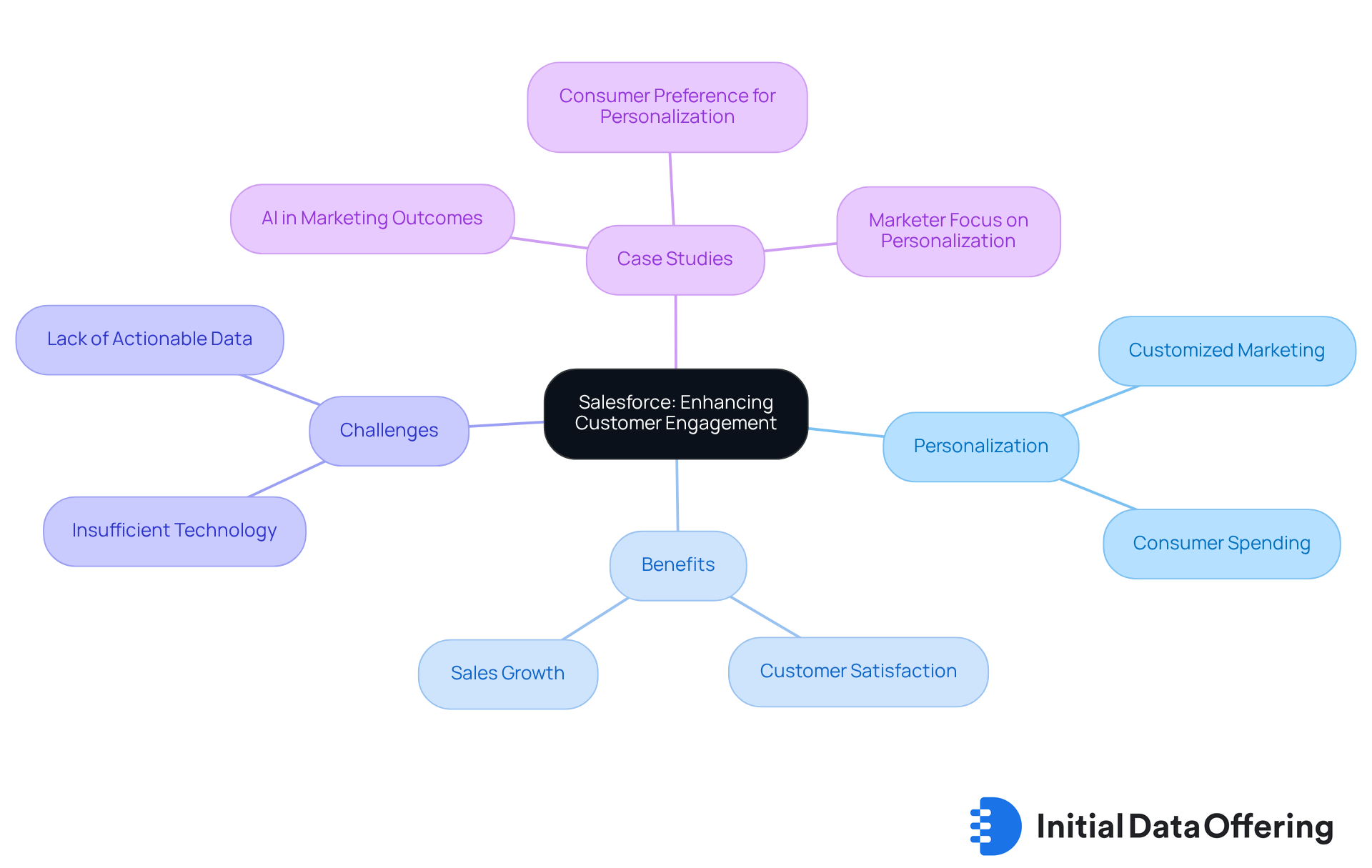
Netflix: Personalizing User Experience with Data Analytics
Netflix employs sophisticated analytics to create a highly customized viewing experience, suggesting content that aligns with individual viewing patterns and preferences. This strategic use of data not only enhances engagement among users but also significantly boosts retention rates. Research shows that personalized recommendations can result in a revenue increase of 10 to 15 percent, with specific outcomes for companies ranging from 5 to 25 percent depending on their execution capabilities. By continuously analyzing consumer behavior, Netflix has established itself as a leader in the streaming industry, showcasing how effective data strategies can drive market success.
Case studies highlight that Netflix's recommendation algorithm, which integrates deep learning models with real-time behavioral tracking, is essential for maintaining customer satisfaction and loyalty. Industry experts assert that personalization transcends mere marketing tactics; it is a crucial element of customer retention. In fact, 76 percent of consumers report frustration when personalization is absent. This underscores the imperative for companies with data to embrace similar data-driven strategies that enhance user experiences and cultivate long-term engagement.
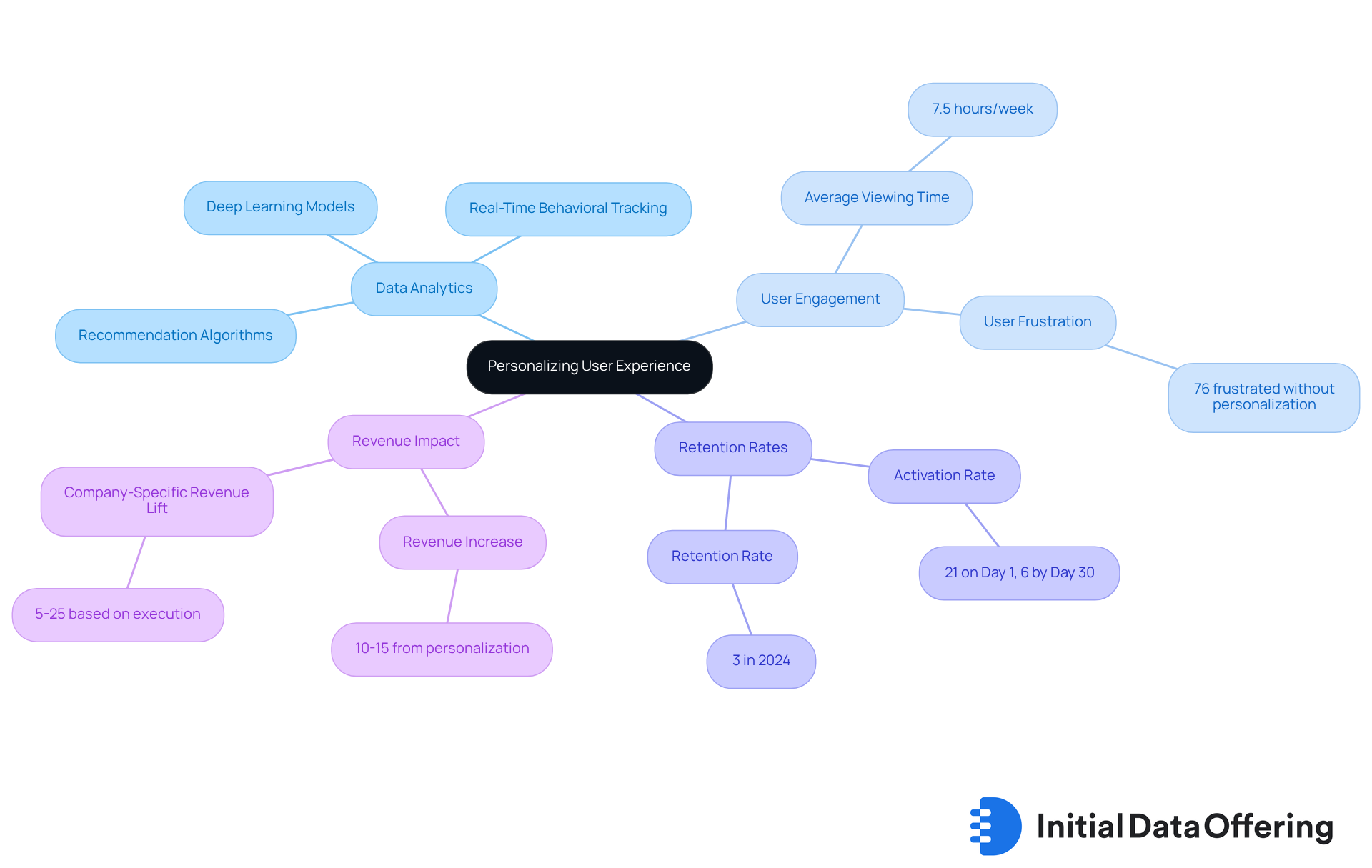
Amazon: Leveraging Data for Inventory Management and Recommendations
Amazon employs advanced data analytics to refine its inventory management and optimize product recommendations. This data-driven approach meticulously analyzes purchasing patterns alongside inventory levels, ensuring that products are readily available to meet customer demand. The advantages of this strategy not only boost operational efficiency but also significantly enhance the overall shopping experience. Notably, firms excelling in customization, such as Amazon, generate 40% additional income compared to typical performers, underscoring the financial impact of information-based strategies.
As Julius Černiauskas, CEO of Oxylabs, points out, 'Companies with data and analytics have become the driving force behind successful competition across industries.' Looking ahead to 2025, the influence of companies with data-driven suggestions is projected to expand, further shaping consumer habits and driving sales in the e-commerce sector. This trend is particularly relevant as technologies like AI and machine learning increasingly become essential to contemporary strategies. How can businesses leverage these insights to enhance their own operations and customer engagement?
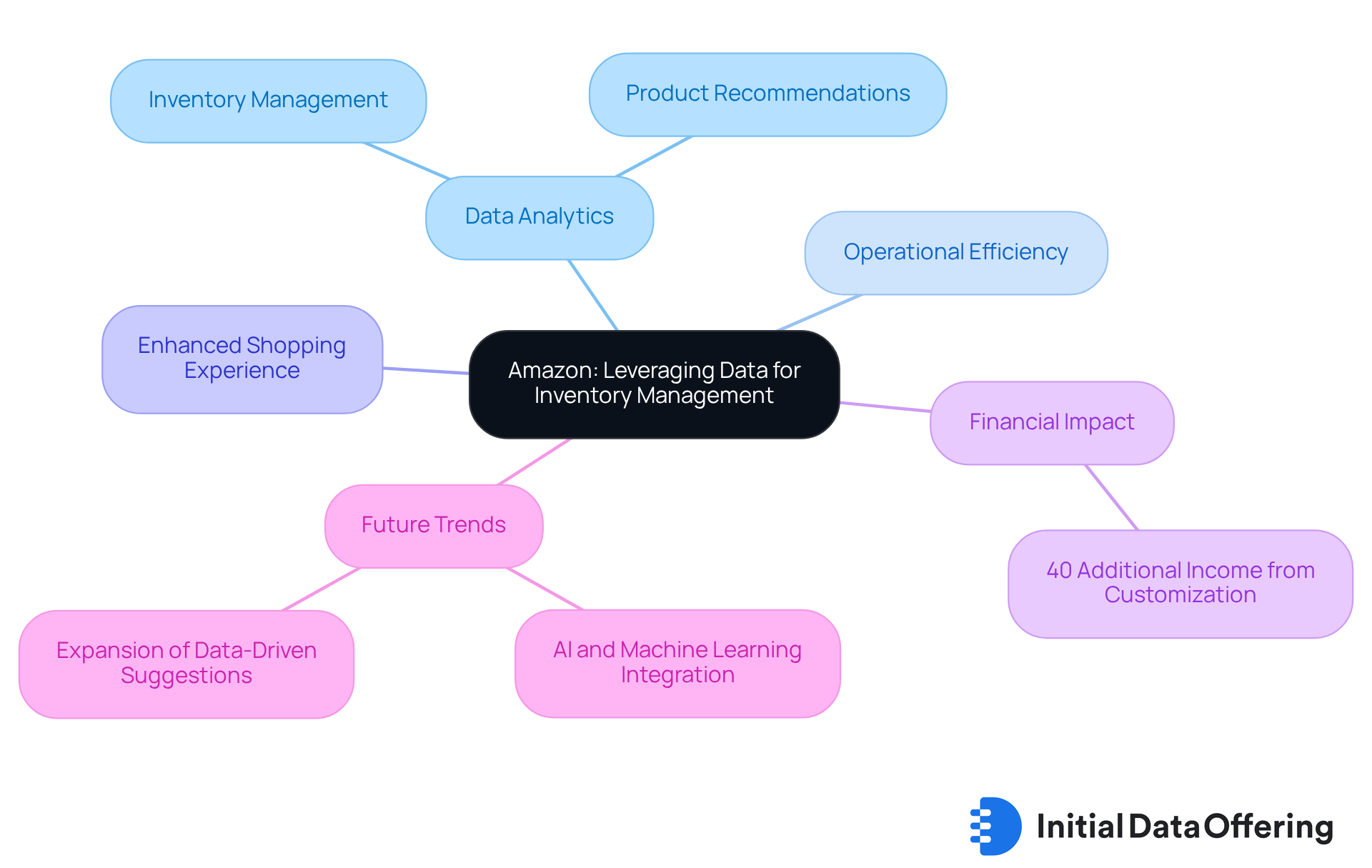
Google: Data-Driven Advertising and User Experience Optimization
Google utilizes data analysis to enhance its advertising approaches, ensuring that ads are relevant to individuals. This data-driven strategy features a thorough examination of consumer behavior and preferences, which enables Google to deliver targeted advertisements. The advantage of this approach is that it not only improves user experience but also maximizes revenue for advertisers. Ultimately, the benefit of leveraging analytics in advertising is evident: it drives market success for both Google and its clients.
Have you considered how this data-driven approach could impact your advertising strategies? By understanding consumer preferences, businesses can optimize their ad placements and reach their target audience more effectively. This underscores the necessity of integrating analytics into advertising efforts, enabling companies with data to thrive in a competitive market.
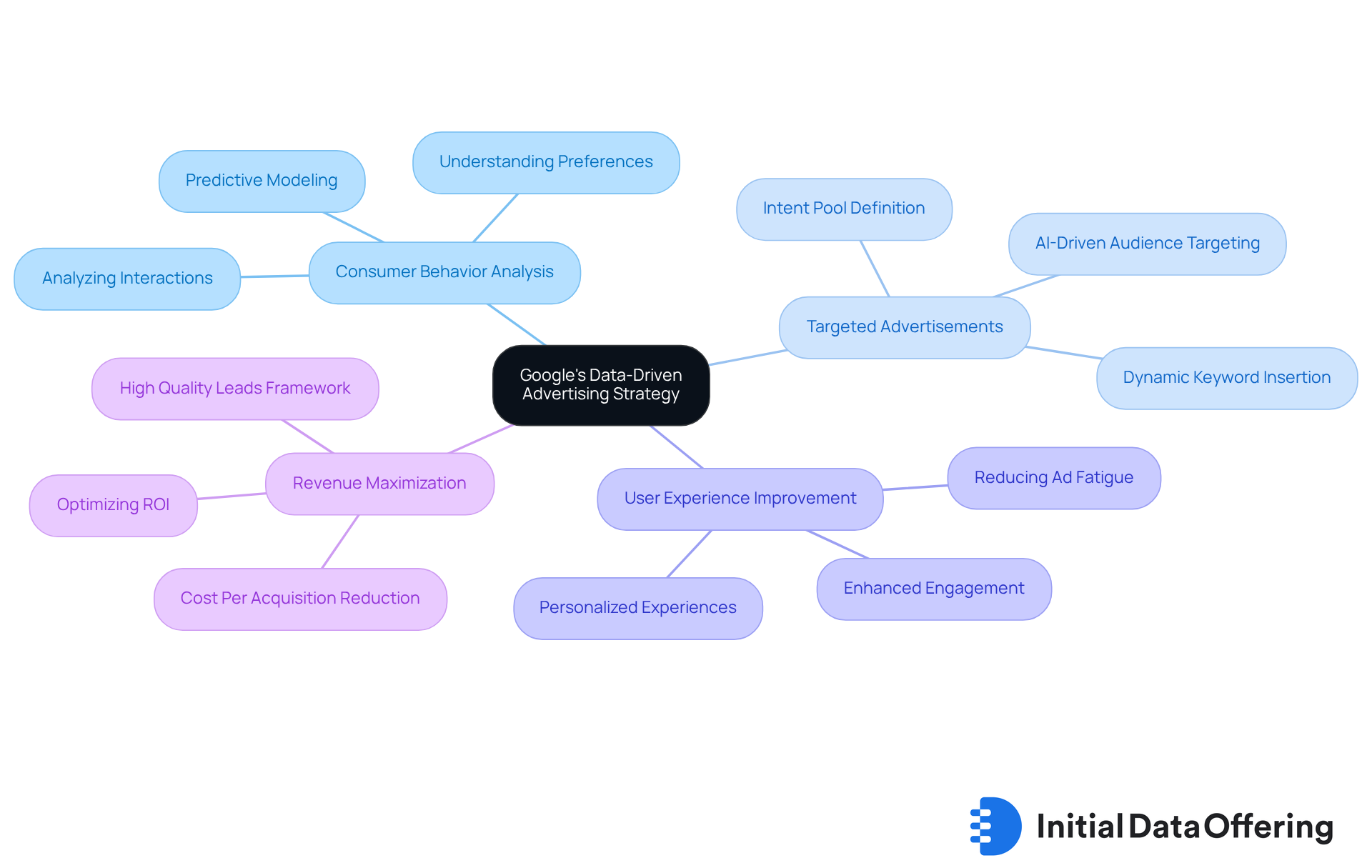
Spotify: Curating Music Experiences Through Data Analytics
Spotify employs sophisticated analytics to create customized music experiences that resonate with its audience. By meticulously examining listening habits and preferences, the platform generates tailored playlists and suggestions, ensuring that users remain engaged and satisfied. This analytics-driven approach not only enhances enjoyment for listeners but also cultivates a strong sense of loyalty, illustrating how powerful analytical strategies can significantly influence success in the competitive music streaming landscape.
For instance, features like Discover Weekly and the AI DJ exemplify Spotify's commitment to personalization, transforming listener data into meaningful musical journeys. The AI DJ, in particular, enhances audience engagement by providing a unique listening experience that adapts to individual preferences. Furthermore, Spotify Wrapped serves as a compelling tool for engagement, turning annual listening habits into a celebratory experience that encourages sharing and community interaction.
However, the commercialization of consumer information introduces ethical considerations that Spotify must address to maintain trust. Such initiatives underscore the profound impact of data-driven curation on audience loyalty and retention, reinforcing Spotify's status as a leader in the industry. How might these strategies influence your own engagement with music platforms?
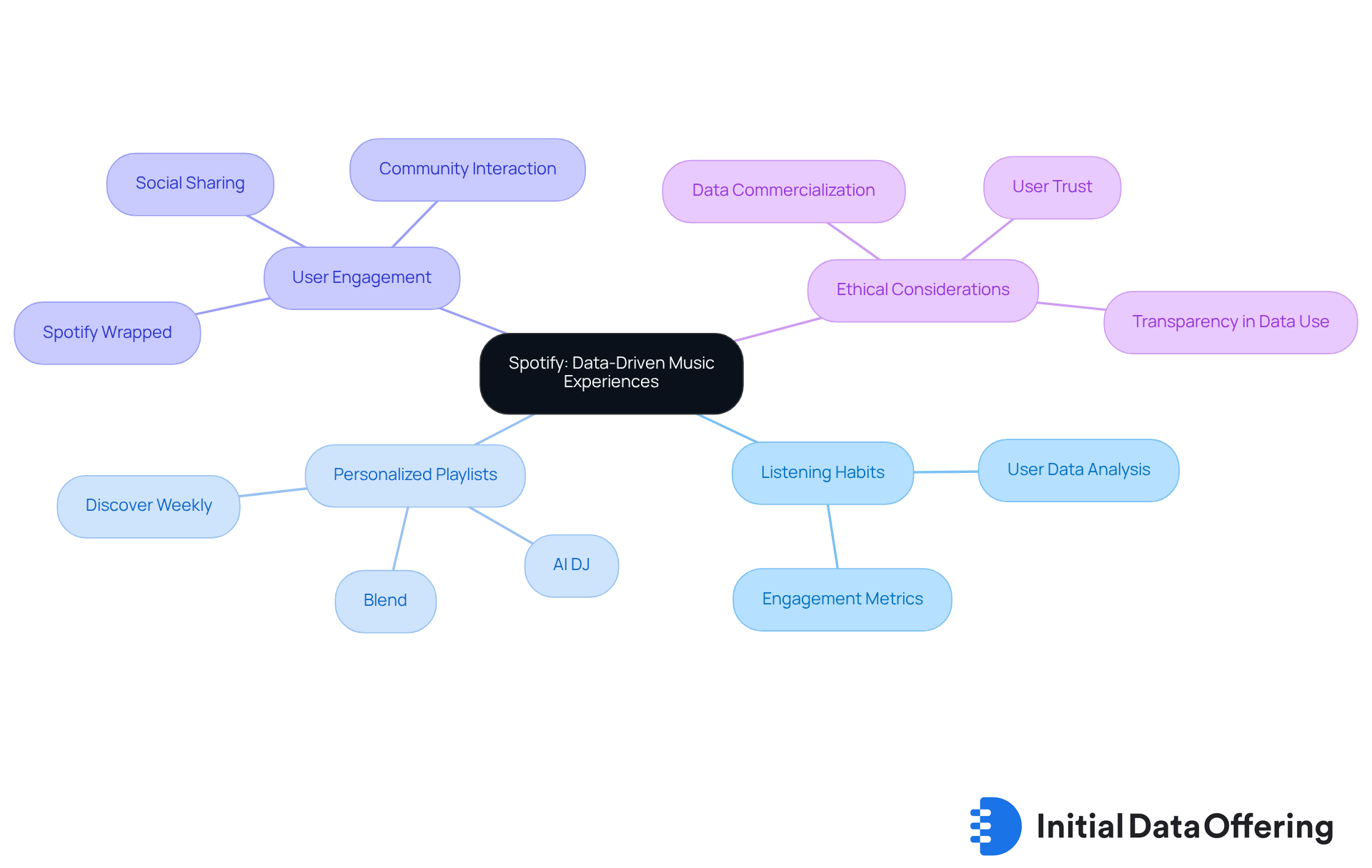
Zillow: Utilizing Data for Real Estate Insights and Market Trends
Zillow employs advanced analytics to deliver insights into real estate trends and property valuations. This feature allows for a comprehensive examination of market statistics and customer interactions, which serves as a foundation for informed decision-making. The advantages of this analytics-driven approach are significant; it not only enhances the user experience but also positions Zillow as a leader in the real estate market. By leveraging effective information strategies, Zillow underscores the importance of companies with data in successfully navigating real estate transactions.
How can these insights assist you in your real estate endeavors? By providing valuable information to both purchasers and vendors, Zillow empowers companies with data to make choices based on solid information rather than speculation. This benefit is crucial in a market that can often feel overwhelming. Ultimately, Zillow's commitment to analytics not only fosters trust among users but also highlights the transformative power of companies with data in the real estate sector.
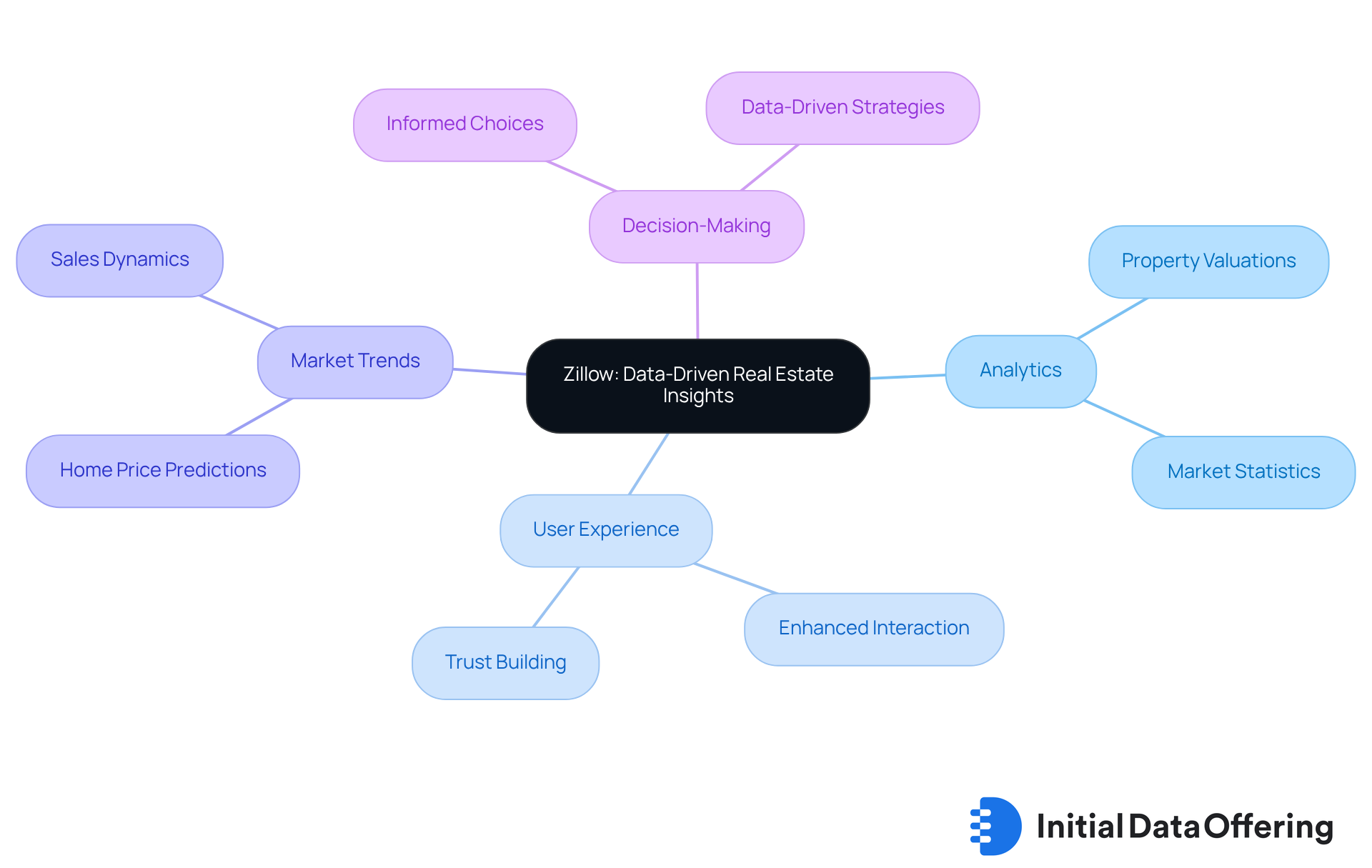
IBM: Driving Innovation with Data Analytics and AI
IBM employs information analytics and artificial intelligence to foster innovation across multiple sectors. This strategic use of technology allows companies with data to improve operations, enhance customer experiences, and develop new products. By harnessing the potential of information, what advantages can businesses gain in today’s competitive landscape? This commitment to utilizing information for innovation underscores the essential role of analytics in achieving market success and maintaining competitiveness in a rapidly changing environment. As organizations adapt, the integration of data-driven insights becomes crucial for informed decision-making and for companies with data aiming for sustainable growth.
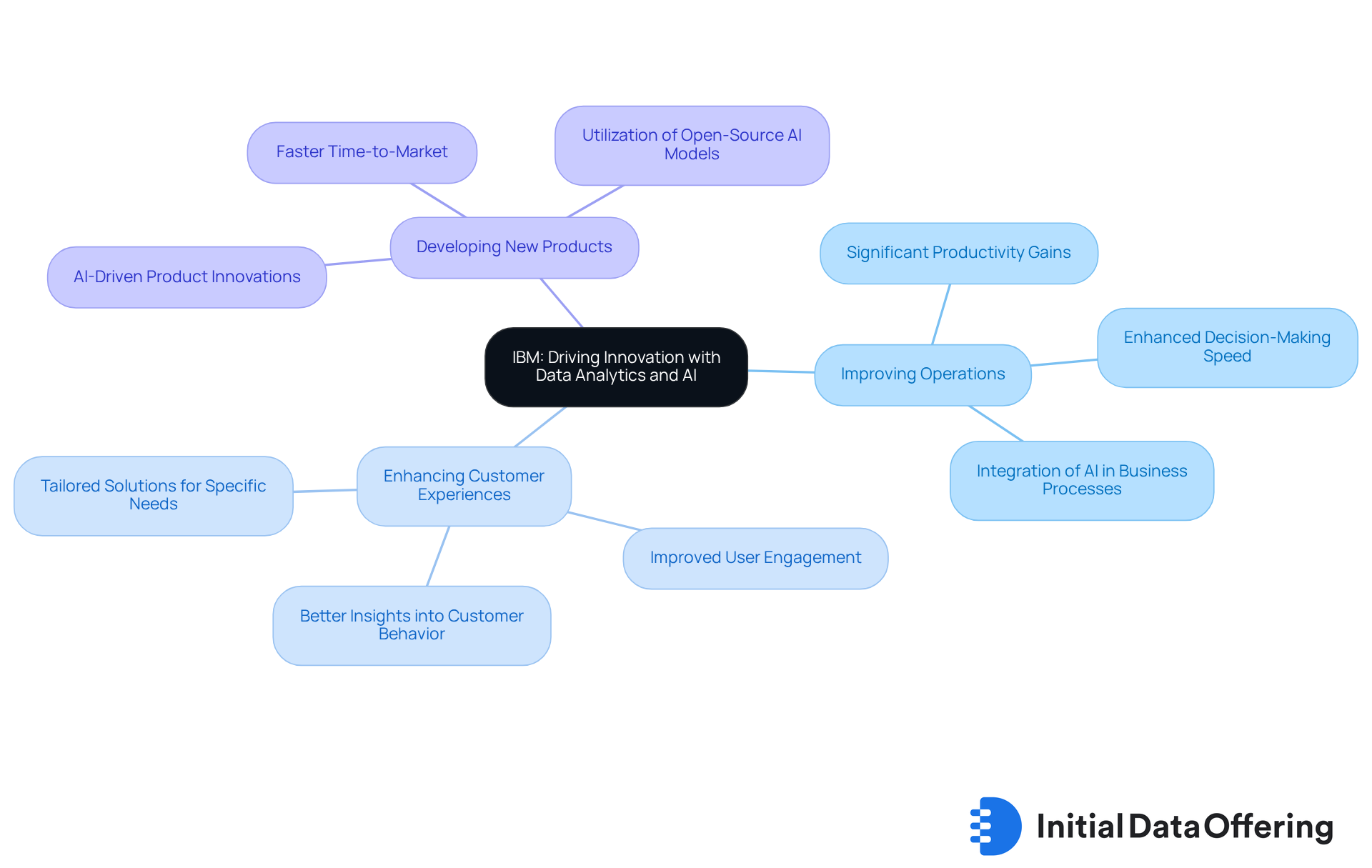
Facebook: Enhancing Engagement and Targeting with Data
Facebook employs sophisticated analytics to enhance engagement and improve advertising targeting. This approach involves thoroughly examining user interactions and preferences, resulting in tailored content and advertisements that resonate with the audience. The customized method not only boosts client satisfaction but also generates significant income for advertisers. Such efficacy demonstrates the power of data-driven strategies in the competitive social media landscape.
Analysts observe that this level of customization leads to improved advertising outcomes, as users are more inclined to engage with content that aligns with their interests. Facebook's commitment to leveraging user data for targeted advertising illustrates how companies with data can enhance marketing efficiency through information-driven methods. Ultimately, this benefits both users and advertisers. Regular updates to Facebook's algorithms ensure the platform remains responsive to user interactions, continuously enhancing the relevance of the content provided.
However, ethical considerations surrounding data usage and personalization remain critical to the conversation. Transparency in algorithmic decision-making is essential for maintaining user trust. How can advertisers balance effective targeting with ethical data practices? This question underscores the importance of fostering a responsible approach to data analytics in companies with data for marketing.
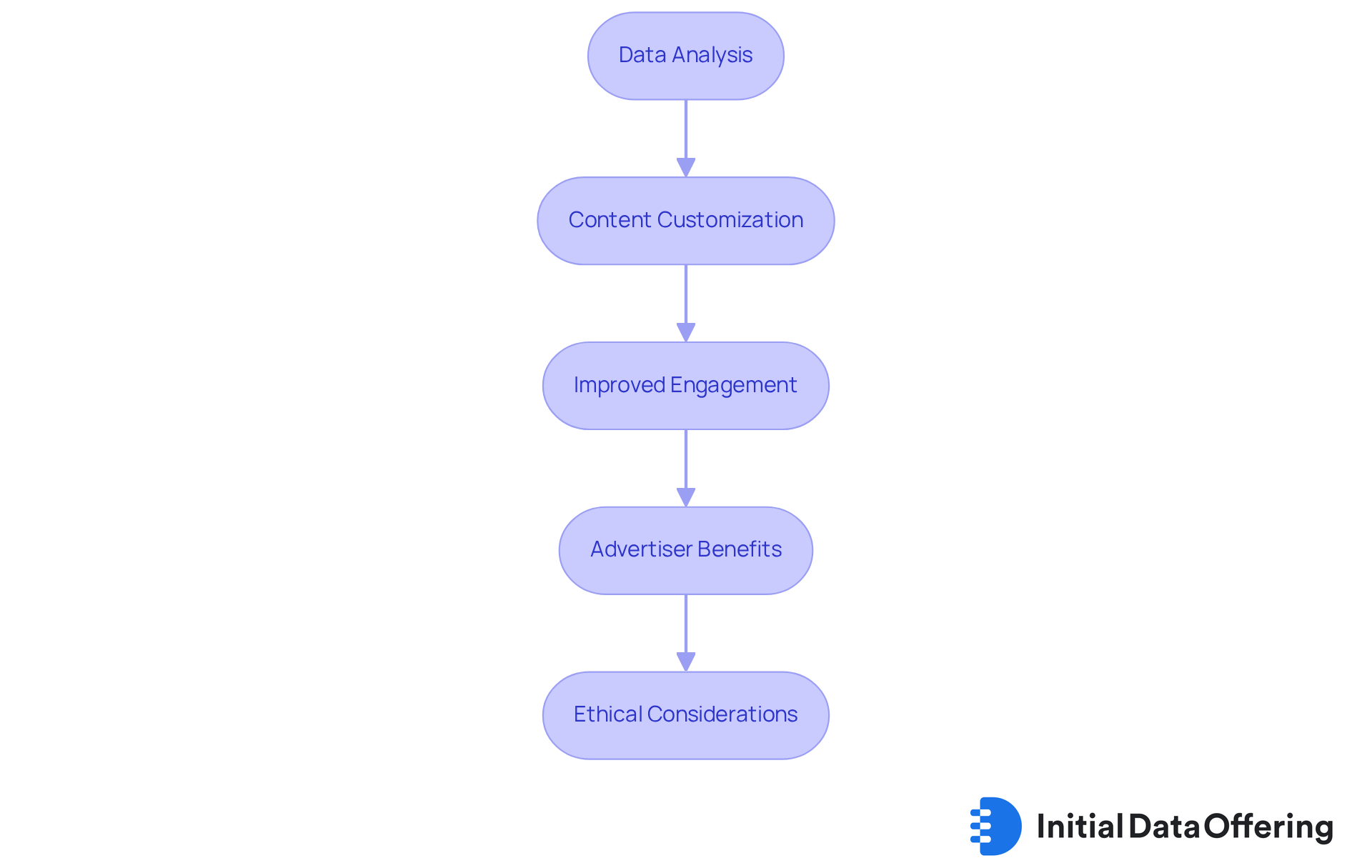
Conclusion
The exploration of how companies leverage data strategies reveals a transformative landscape where informed decision-making is paramount. Organizations like IDO, DCSC.ai, Salesforce, and others exemplify the critical role that data plays in driving market success. Their innovative approaches enhance operational efficiency and foster deeper connections with customers, ensuring that businesses remain competitive in an ever-evolving environment.
Key insights from this discussion underscore the importance of tailored data strategies across various sectors. For instance, IDO's unique dataset marketplace addresses accessibility challenges, while DCSC.ai's AI-driven insights empower investors with real-time analysis. Salesforce and Netflix illustrate how personalized experiences can significantly boost customer engagement and retention. In contrast, Amazon and Google demonstrate the financial impact of data-driven recommendations and advertising. These examples highlight a common thread: the strategic use of data can lead to substantial gains in both customer satisfaction and revenue.
As organizations continue to navigate the complexities of the digital age, embracing data analytics is not just advantageous; it is essential. Companies must prioritize ethical considerations in their data practices to build trust and foster long-term relationships with their audiences. By investing in robust data strategies, businesses can unlock new opportunities for growth and innovation, ultimately shaping the future of their industries. The call to action is clear: harness the power of data to drive meaningful change and ensure sustainable success in the marketplace.
Frequently Asked Questions
What is the Initial Data Offering (IDO)?
The Initial Data Offering (IDO) is a platform designed to simplify the process of launching and discovering new datasets, curating high-quality and unique datasets for businesses, researchers, and organizations worldwide.
How does IDO improve accessibility to datasets?
IDO addresses the disjointed nature of the information marketplace by ensuring that valuable datasets are easily accessible, enhancing the overall decision-making processes for its users.
What role does community involvement play in IDO?
IDO emphasizes community involvement and quality, empowering individuals to leverage information for informed decision-making and positioning itself as an essential resource in today's information-driven environment.
How does DCSC.ai utilize artificial intelligence?
DCSC.ai leverages artificial intelligence to automate the classification of economic information, enabling users to quickly identify investment opportunities through real-time information analysis.
What benefits does DCSC.ai provide to investors?
DCSC.ai enhances decision-making efficiency and streamlines the investment process, leading to improved outcomes for investors, especially in portfolio performance and risk management.
What is the expected trend for AI in investment strategies by 2025?
Recent statistics indicate that the influence of AI on investment strategies is expected to rise significantly by 2025, highlighting the importance of AI tools in navigating complex market conditions.
How does Salesforce enhance customer engagement?
Salesforce utilizes data analytics to elevate customer engagement by analyzing customer interactions and preferences, allowing businesses to create personalized marketing approaches.
What are the advantages of personalized marketing according to Salesforce?
Personalized marketing enhances customer satisfaction and significantly boosts sales growth, with research indicating that it leads to increased consumer spending, particularly among younger generations.
What challenges do marketers face when implementing personalization strategies?
Marketers often face challenges such as insufficient technology, tools, and actionable data when trying to implement effective personalization strategies.
How can organizations leverage insights from Salesforce for marketing?
Organizations can enhance their marketing efforts by considering the implications of personalized marketing, which allows them to better connect with customers and achieve sustainable growth.